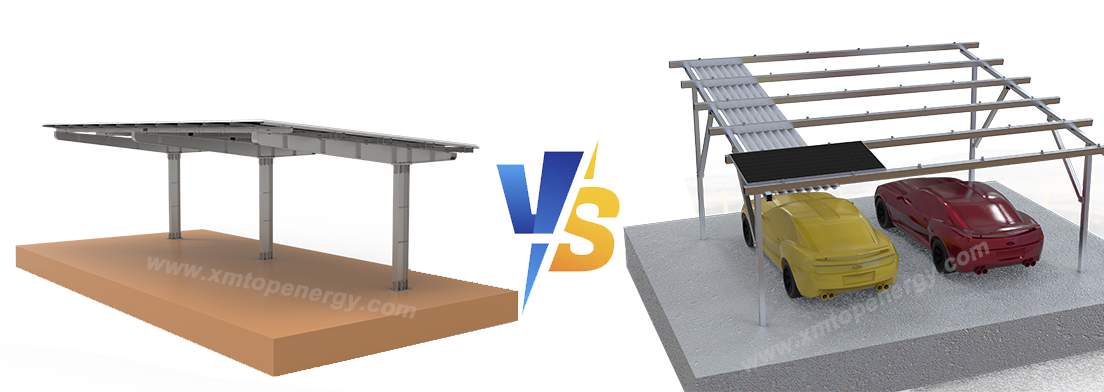The demand for solar carports has surged over the last few years as individuals, businesses, and governments look for ways to integrate solar energy into their daily lives. Solar carports not only protect vehicles from the elements but also serve as a platform for harnessing clean, renewable energy. When it comes to choosing the right material for a solar carport, two materials stand out in the market: carbon steel and aluminum. Both materials have their distinct advantages and disadvantages, and the decision to choose one over the other depends largely on specific project needs, environmental conditions, and budget constraints. Let’s dive deeper into the market comparison between carbon steel and aluminum solar carports to understand the key differences and determine which might be the right choice for your solar installation.

Market Trends and Demand
Carbon steel is a popular choice for solar carports, especially in regions where durability and heavy-duty strength are crucial. Carbon steel carports are gaining traction, particularly in commercial and industrial sectors where large-scale installations are needed. Their cost-effectiveness, strength, and long-lasting performance make them a preferred choice for vehicle shelter solutions in parking lots, warehouses, and public spaces.
Advantages of Carbon Steel Solar Carports:
· Strength and Durability: Carbon steel offers exceptional load-bearing capacity, making it ideal for large-scale solar carports where heavy panels and extreme weather conditions are expected.
· Cost-Effective: Compared to aluminum, carbon steel is typically more affordable while offering a solid, reliable frame for solar panel installations.
· High Wind and Snow Resistance: The robust nature of carbon steel makes it more resistant to heavy snow loads and high winds, ensuring safety and stability in harsher climates.
· Corrosion-Resistant Coatings: Carbon steel is often treated with anti-corrosion coatings to protect against rust and wear over time, which further increases its durability.
Challenges with Carbon Steel Durable Solar Carport Systems:
· Weight: Carbon steel is heavier than aluminum, which can make installation more labor-intensive and require more reinforcement.
· Corrosion in Coastal Areas: Even though corrosion-resistant coatings are used, carbon steel can still be susceptible to rusting in coastal or high-humidity environments, requiring more maintenance.
Market Trends and Demand
Aluminum solar carports are increasingly popular in residential and small to medium-scale commercial projects. The demand for aluminum structures is growing, particularly in urban areas where aesthetic appeal and lightweight construction are top priorities. Aluminum is also a common choice in coastal areas due to its natural resistance to rust and corrosion. These carports often blend seamlessly with modern architecture, providing an attractive solution for homeowners and small businesses.
Advantages of Aluminum Solar Carports:
· Lightweight and Easy to Install: Aluminum is much lighter than carbon steel, making it easier to handle and install. The lightweight nature of aluminum can lead to reduced labor costs and faster installation times.
· Natural Corrosion Resistance: Aluminum naturally resists corrosion, making it a perfect choice for coastal regions or high-humidity environments, where steel might suffer from rust over time.
· Aesthetic Appeal: Aluminum carports tend to have a sleek, modern look that can blend well with contemporary home designs or commercial structures.
· Longevity and Low Maintenance: With its low maintenance needs, aluminum structures are less likely to need frequent repairs or coatings compared to carbon steel, making them a long-term investment for homeowners and business owners.
Challenges with Aluminum Solar Carports:
· Higher Initial Cost: While aluminum offers significant long-term value, its initial cost can be higher than carbon steel, which may be a factor for budget-conscious projects.
· Lower Strength Compared to Steel: Although aluminum is strong, it doesn’t have the same load-bearing capacity as carbon steel, making it less ideal for extremely large or heavy-duty installations.

The choice between carbon steel and aluminum for a solar carport depends on several factors, including budget, climate, and desired aesthetic.
When to Choose Carbon Steel:
· Heavy-duty projects: If you need a strong, heavy-duty structure that can support larger solar panel systems, carbon steel is the ideal choice.
· Cost-conscious projects: For those looking to keep costs down while ensuring structural integrity, carbon steel provides a cost-effective option.
· Areas with extreme weather conditions: If you live in an area prone to heavy snow or strong winds, carbon steel offers superior strength and stability.
When to Choose Aluminum:
· Residential applications: If you're a homeowner or small business owner, and you value aesthetics and lightweight construction, Aluminum solar carports for residential are a great option.
· Coastal or humid environments: For areas near the coast or with high humidity, aluminum’s corrosion resistance makes it a top choice.
· Quick installation needs: If you require a fast and easy installation, aluminum’s lighter weight makes it a better option for reducing labor costs and time.
The market for solar carports is expected to continue growing as more people and businesses seek sustainable and practical ways to generate clean energy while protecting their vehicles. Both carbon steel and aluminum solar carports have their strengths and serve different needs based on the location, budget, and desired benefits. By understanding the strengths and limitations of each material, you can make an informed decision about which option best fits your solar installation needs.

 Xiamen TopFence Co.,Ltd.
Xiamen TopFence Co.,Ltd. No. 77, LingXia South Road, Huli District, Xiamen City, Fujian, China
No. 77, LingXia South Road, Huli District, Xiamen City, Fujian, China Tel: +8613365923720
Tel: +8613365923720
 Email: info@xmtopfence.com
Email: info@xmtopfence.com
 IPv6 network supported Sitemap
| XML
| Blog
| Privacy Policy
IPv6 network supported Sitemap
| XML
| Blog
| Privacy Policy


